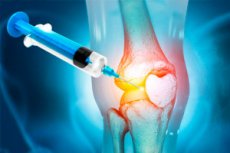New publications
Gene therapy may be a solution for chronic knee pain
Last reviewed: 03.08.2025

All iLive content is medically reviewed or fact checked to ensure as much factual accuracy as possible.
We have strict sourcing guidelines and only link to reputable media sites, academic research institutions and, whenever possible, medically peer reviewed studies. Note that the numbers in parentheses ([1], [2], etc.) are clickable links to these studies.
If you feel that any of our content is inaccurate, out-of-date, or otherwise questionable, please select it and press Ctrl + Enter.

For nearly three decades, Mayo Clinic researcher Christopher Evans, Ph.D., has sought to expand the scope of gene therapy beyond its original purpose of treating rare diseases caused by a single gene defect. That has meant systematically advancing the field through laboratory experiments, preclinical studies, and clinical trials.
Several gene therapies have already been approved by the U.S. Food and Drug Administration (FDA), and experts predict that 40 to 60 more such drugs could be approved over the next decade for a variety of conditions. Dr. Evans hopes that among them will be a gene therapy for osteoarthritis, a form of arthritis that affects more than 32.5 million adults in the U.S.
Recently, Dr. Evans and a team of 18 researchers and clinicians published the results of the first-ever human trial, a Phase I clinical trial of a new gene therapy for osteoarthritis.
The results, published in the journal Science Translational Medicine, demonstrate that the therapy is safe, produced robust expression of the therapeutic gene within the joint, and provided early evidence of clinical benefit.
"This could revolutionize the treatment of osteoarthritis," says Dr. Evans, director of the Musculoskeletal Gene Therapy Research Laboratory at the Mayo Clinic.
In osteoarthritis, the cartilage that cushions the ends of bones—and sometimes the underlying bone—breaks down over time. It is a leading cause of disability and a disease that is extremely difficult to treat.
"Any medication you inject into an affected joint will leak back out within a few hours," says Dr. Evans.
“As far as I know, gene therapy is the only reasonable way to overcome this pharmacological barrier, and it’s enormous.” By genetically modifying joint cells to produce their own anti-inflammatory molecules, Evans aims to create knees that are more resistant to arthritis.
Evans' lab discovered that a molecule called interleukin-1 (IL-1) plays an important role in maintaining inflammation, pain, and cartilage loss in osteoarthritis.
Fortunately, this molecule has a natural inhibitor, the IL-1 receptor antagonist (IL-1Ra), which could form the basis of the first gene therapy for the disease.
In 2000, Dr. Evans and his team packaged the IL-1Ra gene into a harmless AAV virus and tested it in cells and then in preclinical models. The results were encouraging.
In preclinical trials, his colleagues at the University of Florida showed that the gene therapy successfully penetrated the cells that make up the synovial lining of the joint, as well as the surrounding cartilage.
The therapy protected the cartilage from deterioration. In 2015, the team received approval to conduct human trials of the drug. However, regulatory hurdles and manufacturing complications delayed the first injection into a patient for four years. Since then, the Mayo Clinic has implemented a new process to accelerate clinical trial activation that may help researchers launch studies more quickly.
In a recent study, Dr. Evans and his team injected an experimental gene therapy directly into the knee joints of nine patients with osteoarthritis. They found that levels of the anti-inflammatory IL-1Ra increased and remained high in the joint for at least a year. Participants also reported reduced pain and improved joint function, with no serious side effects.
Dr Evans says the results show the treatment is safe and may provide long-term relief from osteoarthritis symptoms. “This study represents a promising new way to treat the disease,” he says.
Dr. Evans co-founded an arthritis gene therapy company called Genascence to take the project forward. The company has already completed a larger Phase Ib study and is in talks with the FDA to launch a pivotal Phase IIb/III clinical trial to evaluate the therapy’s effectiveness — the next step before FDA approval.
